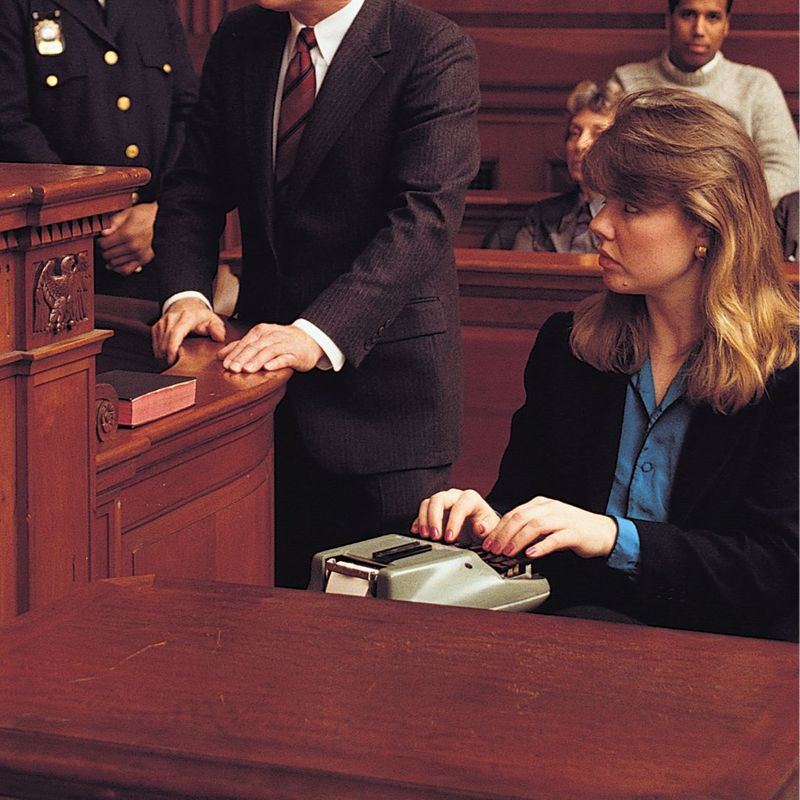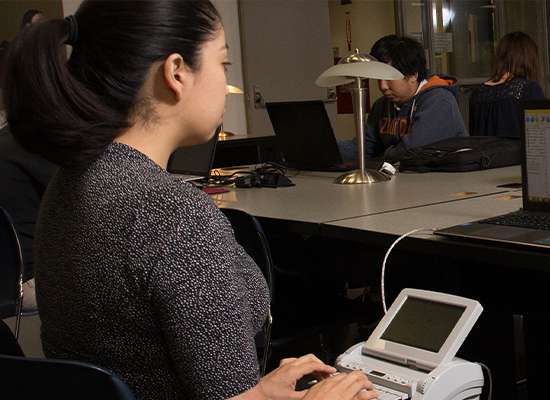The history and evolution of durham court reporting in the U.S. legal system
Everything About Court Reporting: Vital Insights Into Its Relevance in Legislation
Court reporting offers an important feature within the legal structure, offering a precise and trustworthy record of proceedings. Via sophisticated strategies and tools, court press reporters catch the subtleties of testaments and legal discussion. The relevance of their job expands past plain transcription. As the lawful landscape develops, so as well does the function of innovation in court reporting. Comprehending these characteristics exposes deeper effects for justice and openness in the legal system.
The Role of Court Reporters in the Legal System

Although often neglected, stenotype reporter play a vital duty in the lawful system by making sure a verbatim and precise document of process. Their main responsibility entails transcribing spoken words throughout tests, depositions, and various other lawful occasions, which works as an official document for future reference. This documentation is vital for appeals, as it gives the necessary details for examining choices made by courts and juries.
Stenotype reporter have to have extraordinary listening skills and a deep understanding of lawful terminology to catch the subtleties of testimony and argumentation properly. Their work adds to transparency within the judicial process, enabling liability and fairness. Additionally, they facilitate accessibility to justice by making documents readily available to included parties, ensuring that everybody has the opportunity to assess the procedures. By doing this, court reporters maintain the honesty of the legal system, strengthening the importance of accurate interaction in issues of legislation.
Methods and Devices Made use of in Court Reporting
In court reporting, numerous strategies and devices boost the precision and efficiency of transcription. Stenography technology plays a substantial duty, enabling reporters to record spoken words quickly, while digital recording methods offer alternative services for documents. Recognizing these devices is important for realizing how stenotype reporter fulfill their vital feature in the legal system.
Stenography Modern Technology Overview
Stenography technology works as the keystone of modern court reporting, making it possible for effective and accurate transcription of spoken dialogue. Utilizing specialized devices known as stenographs, court reporters can record speech at remarkable rates, commonly going beyond 200 words per min. These machines employ a special keyboard layout that allows several keys to be pushed concurrently, producing phonetic depictions of words - durham court reporting. This method reduces the demand for substantial punctuation and enhances transcription accuracy. Additionally, clerks use numerous shorthand strategies and icons to more simplify the process, making sure that no detail is forgotten throughout procedures. The combination of stenography modern technology not only fosters effective communication in lawful settings but also supports the honesty of the judicial procedure by giving exact and dependable records of conversations
Digital Recording Approaches
A boosting variety of court reporting specialists are turning to electronic recording methods to boost the precision and performance of their transcriptions. These strategies make use of innovative audio and video innovation to catch procedures in real-time. Digital recorders, frequently combined with premium microphones, ensure that every word talked is protected with quality. Specialized software can record audio files automatically, allowing for quicker turn-around times. Some experts include double recording systems for redundancy, ensuring no essential info is lost. In addition, digital recordings can be conveniently indexed and browsed, facilitating quick retrieval of specific segments. As lawful atmospheres advance, embracing these electronic tools not just simplifies the reporting process but also maintains the integrity of the record.
The Relevance of Accuracy in Transcription
Accuracy in transcription is crucial in court reporting, as it assures that lawful records reflect truth content of process. This precision can substantially influence case results, influencing the choices made by judges and courts. Keeping high standards of precision is extremely important in the legal profession.

Precision in Legal Records
Although the lawful system depends heavily on eloquent disagreements and influential unsupported claims, truth backbone of judicial proceedings hinges on the accuracy of lawful documents. Exact transcription is crucial, as it guarantees that every question, declaration, and ruling is recorded properly. Such accuracy offers several purposes, consisting of supplying a reputable recommendation for appeal procedures and keeping the integrity of the judicial system. Errors in transcription can lead to misconceptions, misconceptions, and possibly detrimental effects for all parties included. Court press reporters have to possess remarkable abilities and focus to information, as their work straight influences the clearness of legal documents. Inevitably, the accuracy of lawful records underpins the depend on positioned in the judicial process, strengthening the importance of careful transcription.

Impact on Instance Outcomes
When lawful proceedings unfold, the accuracy of transcription frequently determines the trajectory of a situation's result. Exact court reporting assurances that every word talked is effectively recorded, making it possible for attorneys, juries, and judges to make informed choices based on the document. Mistakes in transcription can cause misunderstandings, misinterpretations, and potentially unfair decisions. The honesty of lawful papers counts greatly on the accuracy of these documents, as they act as the foundation for charms and further lawsuits. In high-stakes instances, where the ramifications are profound, the duty of a stenotype reporter becomes a lot more vital. Consequently, preserving extensive requirements in transcription not just supports the legal process however also supports the concepts of justice and justness in the court.
Court Reporting in Different Lawful Setups
Court reporting plays a necessary function throughout different lawful setups, ensuring that process are precisely documented for future referral. In criminal court, court press reporters record statements, proof, and judicial judgments, which are essential for charms and instance testimonials. In civil lawsuits, accurate transcripts promote the discovery process and provide a trustworthy record for test proceedings. Management hearings usually rely on court reporters to maintain an official record, making certain openness and liability in governmental processes. Household courts additionally gain from court reporting, as exact documents of process can affect wardship decisions and negotiations. Furthermore, depositions in pre-trial stages need specific recordings to catch the subtleties of witness testaments, which might be substantial fit instance strategies. Generally, court reporting functions as a foundation in the legal system, promoting fairness and clearness throughout varied judicial atmospheres.
The Impact of Innovation on Court Reporting
As technology remains to evolve, its influence on court reporting has become increasingly considerable. Innovations such as digital recording, real-time transcription software program, and man-made knowledge have transformed traditional methods. Digital audio recorders currently record court room process with impressive clearness, allowing stenotype reporter to concentrate on subtleties and context instead of only on typing. Real-time transcription technologies enable instant access to records, promoting performance and enhancing cooperation amongst lawful professionals. Furthermore, expert system devices are being integrated to help in the transcription procedure, reducing human mistake and expediting record generation. In spite of these advancements, the essential abilities of court reporters remain indispensable, as they offer a nuanced understanding of lawful language and court dynamics. Eventually, technology enhances site instead of replaces the knowledge of court press reporters, making sure that the stability and precision of lawful documents are promoted in a significantly digital landscape.
Job Opportunities and Pathways in Court Reporting
The development of innovation in court reporting has opened up a variety of career opportunities for striving experts in the field. Commonly, stenotype reporter were primarily liable for recording lawful process. Nevertheless, developments such as digital recording and real-time reporting have actually increased their roles.
Today, stenotype reporter can specialize in areas such as captioning for transmission, offering transcription services for legal companies, and operating in the company field for depositions or meetings - durham description court reporting. Additionally, chances in remote reporting, especially due to the rise of online courts, have actually come to be increasingly prevalent
Educational paths include official training programs, accreditation programs, and proceeding education to stay upgraded with technological adjustments. Networking within expert and lawful organizations also plays a significant role in profession innovation. Generally, the diverse opportunities in court reporting mirror the vibrant nature of the lawful career and the raising need for experienced professionals.
The Future of Court Reporting in an Evolving Legal Landscape
How will the function of court reporting adjust as the lawful landscape continues to progress? As innovation advances, court reporting is likely to welcome ingenious tools such as artificial intelligence and real-time transcription software program. These improvements might boost accuracy and effectiveness in recording lawful process. Moreover, the increasing occurrence of remote hearings necessitates that court press reporters become proficient in electronic systems, making certain smooth documents no matter place.
All at once, stenotype reporter will require to adapt their skills to handle new kinds of cases, such as those involving cyber legislation and copyright conflicts, which need specialized knowledge. In addition, the need for instant access to records will certainly press experts to deliver quicker turnaround times without jeopardizing top quality. Inevitably, the future of court reporting will certainly rest on an equilibrium between typical skills and technological assimilation, making certain that the stability of the legal process continues to be intact in a progressively digital world.
Frequently Asked Concerns
Just How Do Stenotype Reporter Deal With Delicate Info Throughout Process?

What Qualifications Are Needed to Come To Be a Stenotype Reporter?
To end Related Site up being a court reporter, individuals usually require a high institution diploma, specialized training from an accredited program, effectiveness in shorthand or voice writing, and accreditation or licensure, relying on state demands and policies.
Are Court Reporters Required to Have a License?
Stenotype reporter are often required to get a permit, relying on the jurisdiction. Licensing warranties that they satisfy details requirements of efficiency and professionalism and reliability, which is necessary for maintaining the stability of lawful process.
Just How Do Stenotype Reporter Handle Various Accents and Languages?
Court reporters take care of various accents and languages with comprehensive training, technique, and knowledge with numerous speech patterns. They frequently make use of specialized software program and techniques to accurately capture spoken words, ensuring clearness and precision in their records.
What Is the Average Income for a Stenotype Reporter?
The typical wage for a court reporter varies by location and experience, usually ranging from $50,000 to $80,000 each year. In high-demand locations, incomes can surpass $100,000, reflecting the occupation's value and specialized abilities.
Frequently overlooked, court press reporters play an important function in the legal system by making sure a accurate and verbatim document of process. In criminal court, court reporters transcribe testimonies, proof, and judicial judgments, which are essential for charms and situation evaluations. Household courts likewise benefit from court reporting, as accurate documentation of procedures can influence safekeeping choices and negotiations. Typically, court reporters were primarily liable for recording legal process. Today, court reporters can specialize in locations such as captioning for tv programs, supplying transcription solutions for lawful firms, and working in the business field for depositions or meetings.